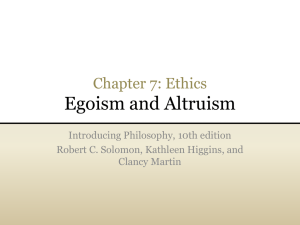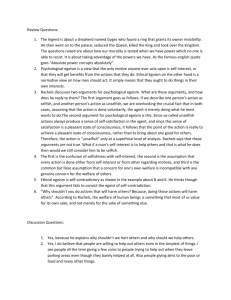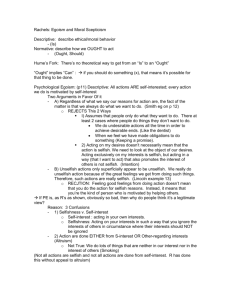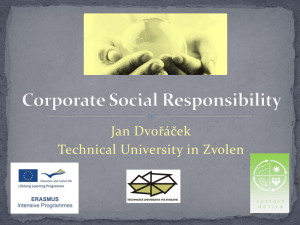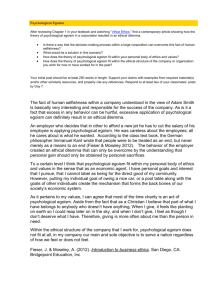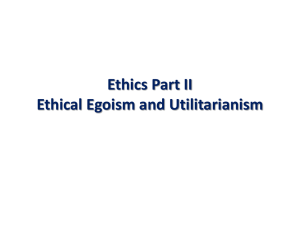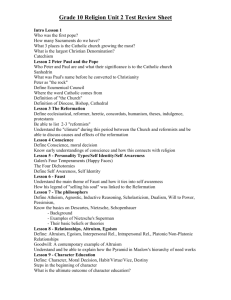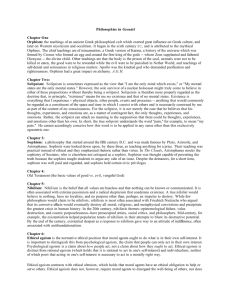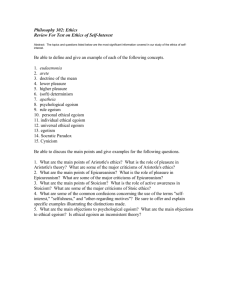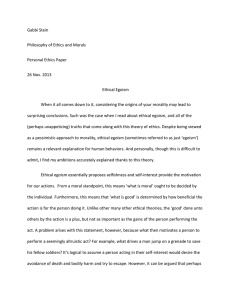Is Altruism Possible?
advertisement
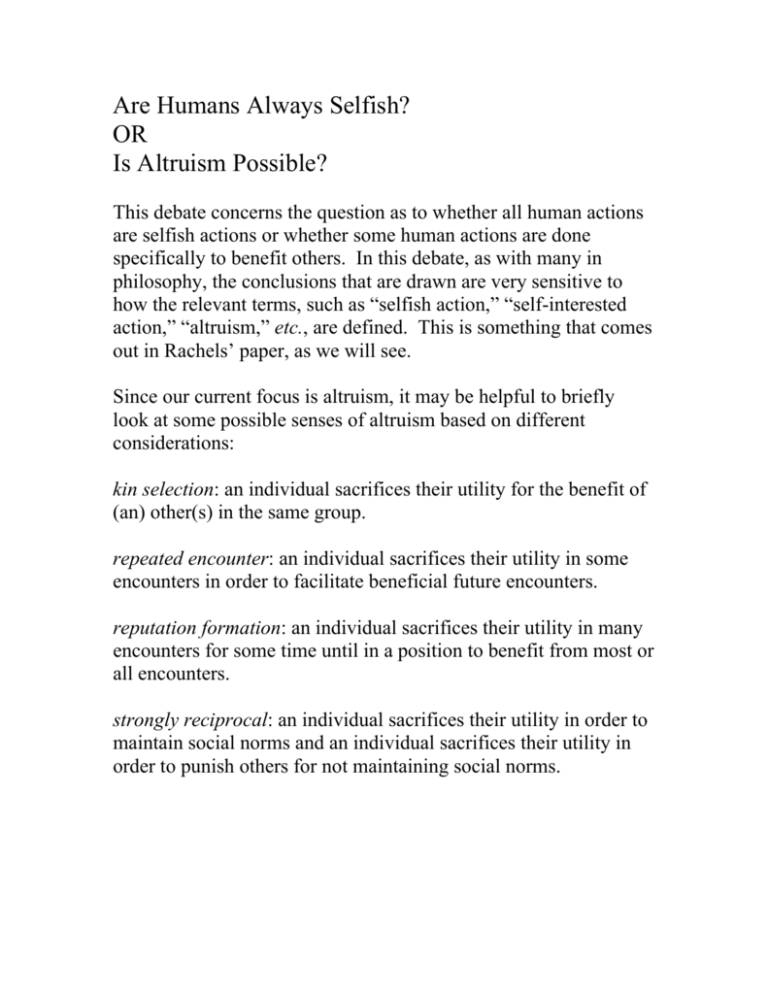
Are Humans Always Selfish? OR Is Altruism Possible? This debate concerns the question as to whether all human actions are selfish actions or whether some human actions are done specifically to benefit others. In this debate, as with many in philosophy, the conclusions that are drawn are very sensitive to how the relevant terms, such as “selfish action,” “self-interested action,” “altruism,” etc., are defined. This is something that comes out in Rachels’ paper, as we will see. Since our current focus is altruism, it may be helpful to briefly look at some possible senses of altruism based on different considerations: kin selection: an individual sacrifices their utility for the benefit of (an) other(s) in the same group. repeated encounter: an individual sacrifices their utility in some encounters in order to facilitate beneficial future encounters. reputation formation: an individual sacrifices their utility in many encounters for some time until in a position to benefit from most or all encounters. strongly reciprocal: an individual sacrifices their utility in order to maintain social norms and an individual sacrifices their utility in order to punish others for not maintaining social norms. There are two other important terms that we need clear definitions of, which are psychological egoism and ethical egoism. Psychological egoism is the belief that every time people do something, they do it in order to promote what they conceive to be their own happiness. Even in cases where people act in a calculated way to benefit others, they are motivated by the belief that acting in this way is to their advantage. This is a purely descriptive claim, a claim about how people actually behave. Ethical egoism is the belief that all people ought to act purely in their own interests without regard to the interests of others. This is a prescriptive, or normative, claim, a claim about how people should behave. The excerpt from Plato essentially puts forth a psychological egoist view and Rachels’ article attempts to refute psychological and ethical egoism. An interesting thing to note about this debate and many ethical debates or views in general, is that the focus is placed on the psychological state of the agent. What action is right or wrong is determined to be so as a result of the states of consciousness that are produced in the people involved in that action. For instance, an action is altruistic if the agent acts in such a way that their happiness is reduced, but someone else’s is increased. There are other ways of approaching the issue of altruism, however, such as how it is examined in evolutionary biology. In this context, however, whether altruism exists or not is not the subject of debate; it is taken to exist and an explanation for its development is sought. Of course it is possible that what appears to be altruistic behaviour is only apparently so, but that is a different question. The question at issue in terms of giving an explanation for altruistic behaviour is: how can the evolution of altruistic behaviour, which in most of its manifestations appears to be distinctly human, have occurred? Why is there not a debate about altruism itself here? This is because altruism is defined externally, or behaviourally. That is to say, altruism is defined in terms of the agent’s behaviour not in terms of the emotional or psychological states of the agent. Thus, in this context human actions are analyzed not in terms of psychological cost or benefit but, rather, in terms of economic cost or benefit (or, in evolutionary terms, (reproductive) fitness benefit or detriment). This highlights another question, fundamental to ethics: how do we define the currency of human interactions? How do we define utility? That is to say, how do we define the kind of benefit (or detriment) attached to particular actions? One common way of defining utility is in terms of happiness, but there are many other possibilities, e.g. ecological cost or gain. Can you think of any other possibilities? A common view concerning human nature is that psychological egoism is true. In situations when humans are not constrained or prevented in some way from doing wrong, an agent will always do wrong if it is to their benefit. This is based on the claim that to do wrong is intrinsically desirable, since it gives advantages. Even though an agent usually knows that to suffer wrong is not desirable, this does not prevent her from doing such wrongs to others in the absence of constraint. Naturally this is the case, since by definition psychological egoism entails that humans disregard the interests of others. In considerations of the origin of the state, or a society governed by some individual or body and subject to laws, this is a starting point that appears in many places; cf. Hobbes (next week’s reading). This is the kind of view given by Glaucon in the reading by Plato. The question from this point of view is: If people will always do wrong if it is to their benefit, then how did the state, in which behaviour is restricted by laws, evolve? We will look at this in detail next week. Glaucon is concerned with another question: What is the origin of justice? Towards this let me first ask a closely related question: If to do wrong is intrinsically valuable and people always act purely in terms of self-interest without regard to the interests of others, then why would anyone enter into and respect covenants and contracts? Covenant: 1. A mutual agreement between two or more persons to do or refrain from doing certain acts; a compact, contract, bargain; sometimes, the undertaking, pledge, or promise of one of the parties. (OED Online) Contract: 1. a. A mutual agreement between two or more parties that something shall be done or forborne by one or both; a compact, covenant, bargain; esp. such as has legal effects 2. In a legal sense: An agreement enforceable by law. (OED Online) Glaucon claims that those who have seen both sides but do not have the power to seize the advantage or escape harm, decide it is better to avoid doing or receiving harm. Under these conditions it is in the best interest of a person to enter into and respect covenants or contracts with others since it minimizes the chances of having harm done to her. Thus, it is for these reasons that laws and covenants evolved, which then determined the lawful and right. It is right to respect your covenants and wrong to not do so. It is in this way that justice or right emerged. On this view, what do the just and unjust person have in common and what distinguishes them? Justice, on this view, is not intrinsically valuable, but valuable for those who lack the power to do wrong. People practice justice against their instincts because of a lack of power to do wrong. The just and unjust person alike, if freed of all barriers, would be led by their desires, following their self-interest, until law and custom forced them to respect the principle of equality. The just and unjust person alike realize that they would be best off if there were no consequences to any of their actions and so they could act any way they please. The difference between them is that the just person will obey laws and respect covenants when she is not in a position to do wrong without consequence, and the unjust person will do wrong anyway. Most people intuitively find such a view unacceptable. The reason for this is that most of us have the following kinds of moral intuitions: that we have an obligation to consider the welfare of others in deciding how to act; that we must refrain from acting in harmful ways; that we must respect other people’s rights as well as our own; and that people are not wholly selfish and people sometimes act in the interests of others. An example that supports such intuitions is where Jane gives up a vacation, which she would have enjoyed very much, to help a friend with her studies, which is miserable for her. Neither psychological egoism nor ethical egoism is consistent with such intuitions. Why is this so? Rachels considers three confusions about psychological egoism: 1) Confusion of selfishness with self-interest. Much behaviour is self-interested, but it is only selfish when it ignores the interests of others (particularly in circumstances where their interests ought not be ignored). Selfishness is an evaluative term, self-interested is descriptive. 2) The assumption that every action is done either from selfinterest or from other-regarding motives. So if there is no altruism, all acts are self-interested. This is a false dichotomy—consider the person who continues to smoke even after learning that smoking causes cancer. This is undisciplined pleasure-seeking, not acting in self-interest. (so not all actions are selfish and not all actions are done out of self-interest.) 3) The assumption that a concern for one’s welfare is incompatible with genuine concern for the welfare of others. We can desire our own well-being and the well-being of others. Even if we suppose that these points produce a significant enough challenge to psychological egoism that it can be disregarded, the normative claim made by ethical egoists is not refuted. Why is this so? The ethical egoist would agree, at this point, that people behave altruistically, but say that there is no reason why they should do so—a person is under no obligation to do anything other than act in their own self-interest. One who opposes ethical egoism would accept the following two claims: We should not do harm to people because other people would be harmed. We should act to benefit others because others would benefit. What supports these claims? The claims are supported by the view that human welfare is intrinsically valuable. Thus, an explanation as to why we should not blow up a building as that people will be killed is complete and not in need of further reasons. This brings us up to a fundamental requirement of rational action: the existence of reasons for action always depends on the prior existence of certain attitudes of the agent. For example, a course of action that makes someone a lot of money is a reason for doing it only if the agent wants to make money—the fact that practicing a particular instrument makes one a better player is a reason for practicing only if the person wants to be a better player. Rachels points out that when an ethical egoist does not accept “I would harm another person” as a reason for not doing an action, she is saying that “[she] has no affection for friends or family, that [she] never feels pity or compassion, that [she] is the sort of person who can look on scenes of human misery with complete indifference, so long as [she] is not the one suffering.” (165) Thus, genuine ethical egoists are rare, which highlights how fundamental the feeling of sympathy is to the human psychological makeup. It seems as though one would have to be something like a sociopath in order to be an ethical egoist. This, Rachels argues, is the sort of thing that makes ethical egoism such a disturbing view in the first place. He finishes with a comment to the effect that the fact that we sometimes act in ways that are not in accord with our moral principles is due to poor judgment, not from the fact that we don’t have such moral principles
